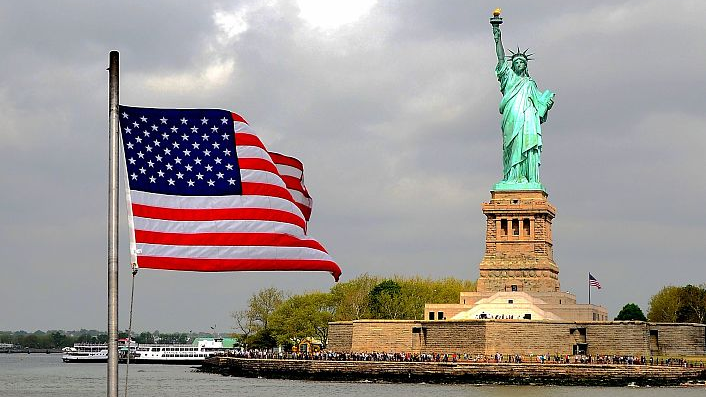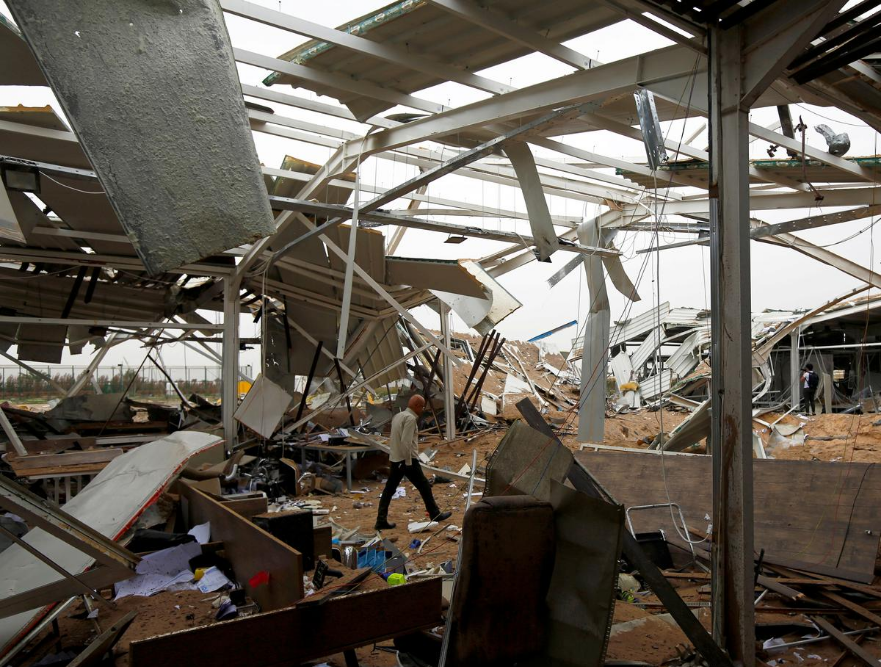
The flag of the U.S. and the Statue of Liberty. /CFP
The flag of the U.S. and the Statue of Liberty. /CFP
Editor's note: Azhar Azam works in a private organization as a market and business analyst and writes about geopolitical issues and regional conflicts. The article reflects the author's opinions and not necessarily those of CGTN.
The empirical and theoretical variants of the U.S. political philosophy, democratic peace theory – "monadic" (democracies generally are pacific in their relations with other states), "dyadic" (democracies do not go at war with other democracies) and "systemic" (the existence of more democracies makes a region or the international system more peaceful) as well as the proposition the democracies tend to fight shorter and win wars or avoid military aggression – are conceptually crude and no less than an intellectual gaffe.
Washington's covert intervention in foreign democracies is one fine example. An overriding principle of the democratic peace theory is: the democracies do not use force against each other. But the researches show the U.S. has not only been involved in use of force to topple a number of democracies by use of force; it also attempts to influence the results of foreign elections.
Just a couple of years before the establishment of the UN, the U.S. President Franklin D. Roosevelt joined British Prime Minister Winston Churchill and the Soviet Union leader Joseph Stalin in the Tehran Conference in 1943. During the summit, he outlined his vision of "Four Policemen" to Stalin, comprising China, Soviet Union, Britain and the U.S. , that "would have the power to deal immediately with any threat to the peace and any sudden emergency which requires action."
Soon the U.S. flouted its own proposal and ganged up an alliance against the Union of Soviet Socialist Republics (USSR), which it believed posed a challenge to promotion of the so-called liberal democracy around the world. The Soviet Union collapsed, marking the official end of the Cold War; international governments' and the public's concerns about "hypocrisy costs," a "real or perceived disparity between a professed commitment to liberal values and norms and demonstrated actions that contravene such commitment," drove the U.S. decision makers conducting military operations secretly in the post-Cold War.

A worker checks the damages at an under-construction civilian airport which was hit by U.S. air strikes in Kerbala, Iraq, March 13, 2020. /Reuters
A worker checks the damages at an under-construction civilian airport which was hit by U.S. air strikes in Kerbala, Iraq, March 13, 2020. /Reuters
On the onset of the 21st century, the 9/11 terror attacks on the U.S. strengthened the world's memory that the terrorism was a genuine threat to global peace and security. Yet for America, one of the greatest catastrophes in the country's history provided an opportunity to coerce its democratic peace model on other states. It unlawfully invaded Iraq in 2003 without authorization of the UN Security Council in violation of the organization's UN charter that remained the bedrock of international relations since the end of the World War II.
Quite a few in the U.S. continue to be in a state of denial any other democratic system can offer a better substitute to America's governance model, fearing it will end their already shaking liberal hegemony. They label rivals as "autocratic," "authoritarian" or "totalitarian."
Such observations fail to notice the U.S. was shooting itself in the foot by trying to implement its democratic peace theory internationally. The U.S. covert military actions failed to encourage "democratic accountability" in the post-Cold War countries; its grievous invasions of the Middle East and North Africa (MENA) states left them more destabilized.
This "false promise" to mete out liberal democracy to the world for restoring America's dominance ruined Afghanistan, Libya, Syria and many African countries; the U.S. disregard of the Mideast's grandeur and long history overwhelmed the region's cultural heritage, allowing the terrorist organizations to reconsolidate power.
Another essential tool to push America's democratic peace and strategic interests is the National Endowment for Democracy (NED). The U.S. quasi-governmental organization was created in 1983 and channeled millions of taxpayers' dollar to counter the USSR. In recent years, it has expanded its network to other parts of the world.
But nations and domestic groups are standing up to the U.S. for resorting to democratic interference. While people in Thailand demand America to stop "hybrid war," rights activists of Malaysia seek their political parties to stop accepting funds from the U.S. Central Intelligence Agency (CIA)'s "soft power front," referring to the NED. The CIA "sidekick" has even ploughed millions into seven British media groups, according to investigative media organization the Declassified UK.
At present, China is the specific target of the NED. Counting on relentless financial support of the White House and Congress, it has been approaching the opposition parties, groups and organizations in Hong Kong Special Administrative Region.
For decades, democratic peace theory fueled up the struggling neoliberals to destabilize the world states, allies or non-allies, through global spread of capitalism and expand the U.S. hegemony. Yesterday, Latin America and the Caribbean was the target of the U.S. invasive foreign policy; today it is the MENA region and China and tomorrow, it seems to be Europe. Even as America fails to achieve objectives, international solidarity should be strengthened against threats to state sovereignty and global peace from the U.S. to pressure Washington mend the invasive character of its hawkish and predatory posture.
(If you want to contribute and have specific expertise, please contact us at opinions@cgtn.com. Follow @thouse_opinions on Twitter to discover the latest commentaries in the CGTN Opinion Section.)